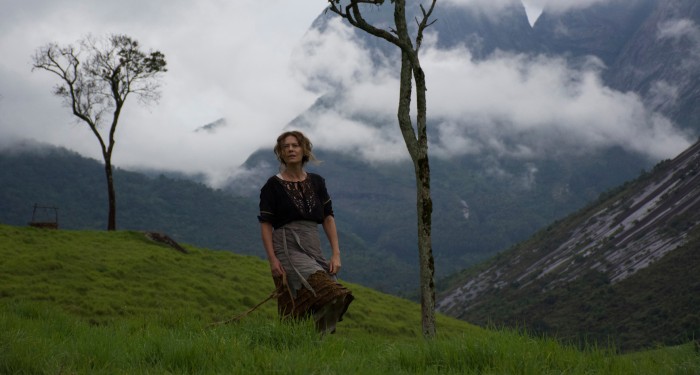Unicórnio (Unicorn)

A surreal parable of a young girl at a time of curiosity and inner tumult and sweeping landscape shots come together in this Brazilian drama, Unicórnio. Director Eduardo Nunes’s second feature is a visually stunning example in the usage of both excellent cinematography and colour in the making of an otherworldly setting that’s beautiful to experience on a surface level. It’s a gorgeous picture of a film but one that regrettably lacks any kind of compelling or particularly evident storyline. While certainly to be applauded for its captivating imagery, Unicórnio is lost without any real dramatic elements to sink its teeth into.
One is immediately, and for the duration of the movie, drawn in by the stunning pictures on the screen. The sprawling mountain landscape is presented in extremely saturated colours and is nothing short of breathtaking. Nunes makes use of slow camera push-ins, effectively holding the air in the room and letting us fully breathe in the moment. Even in the alternative white-walled world in which Maria (Bárbara Luz) meets with her father (Zé Carlos Machado), the hues and pace are in tune with the rest of the film and produce a rather dream-like effect. The problem with dreams is that they are by definition ambiguous turmoil, often difficult to remember if not lost altogether upon waking.
As Maria and her father sit in his white-tiled room, he relates to her a story of her living in a remote mountain home with her mother (Patrícia Pillar). The arrival of a new man (Lee Taylor), with whom the mother begins a relationship, troubles the daughter and she acts out in moments of defiance laced with hints of awakening desire, curiosity and jealousy. The cast perform with an enormous amount of grace and subtlety but perhaps the flaw lies within the written subtlety of the characters and plot in general. Her father relates to Maria a number of stories, all of which seem to be set up as parables or lessons on life, but all of which end in rather ambiguous or intangible thoughts. There seems to be no lesson learned and, thus, one wonders what the purpose of telling the story was in the first place.
The dreaminess and intangibility of Unicórnio make it difficult to connect the dots and discern any real storytelling elements. A beautiful film to watch but one that leaves much to be desired.
Zoe Tamara
Unicórnio (Unicorn) does not have a UK release date yet.
Read more reviews from our Berlin Film Festival 2018 coverage here.
For further information about the event visit the Berlin Film Festival website here.
Watch the trailer for Unicórnio (Unicorn) here:


























Facebook
Twitter
Instagram
YouTube
RSS